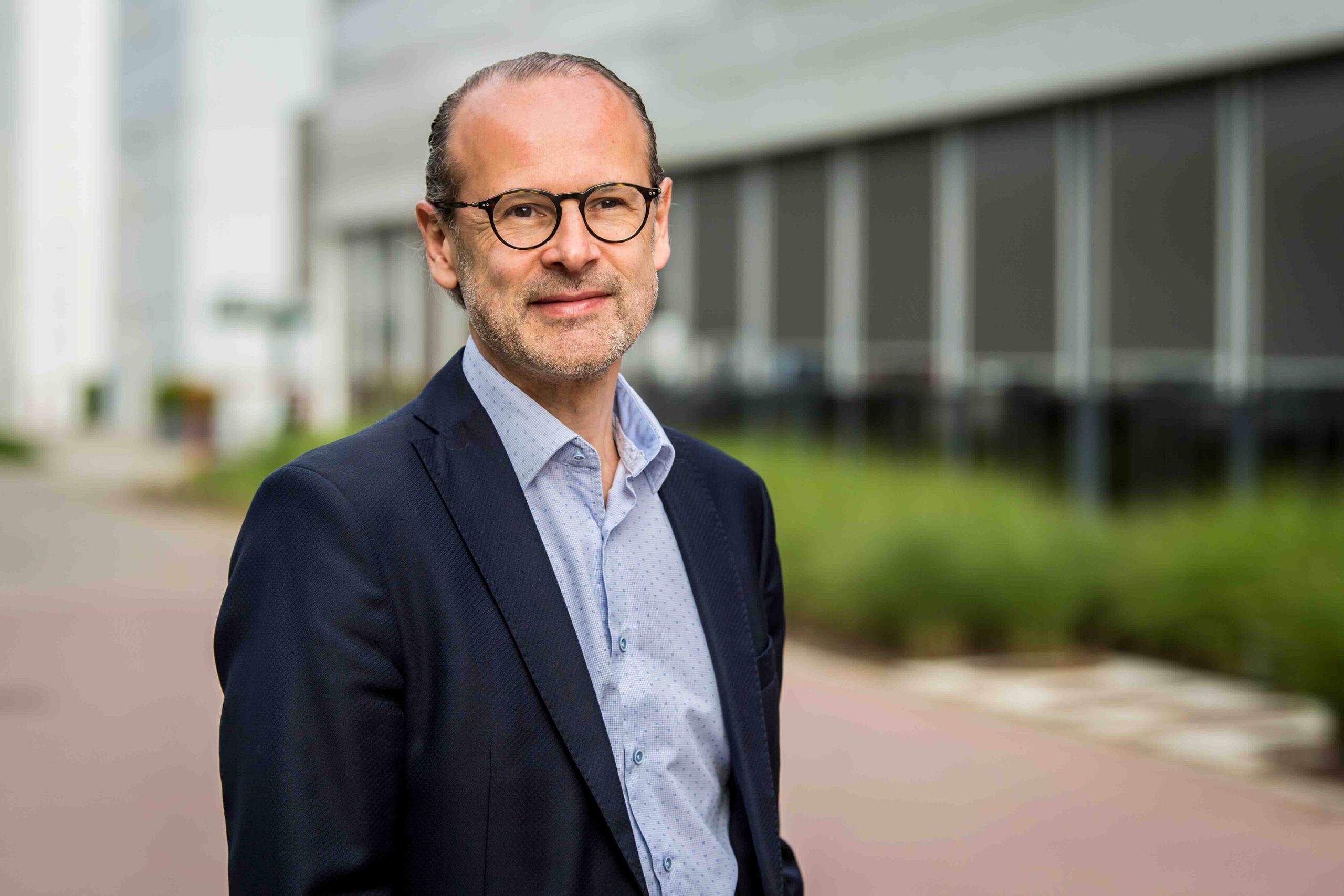This article was part of a series on ‘Biology meets Technology’ in the lead-up to Science for health 2023, which Werner Verbiest will be attending as a member of the organizing Scientific Committee. Header image: Werner Verbiest (©frederikbeyens).
Q: Could just tell us about the Science for health theme this year?
Werner Verbiest (Strategic Alliances Leader, Janssen Pharmaceutical Companies of Johnson & Johnson): “The title of this year’s event is ‘Biology meets Technology’. When we speak of biology in biotech and pharma, we’re referring to everything from the cell to the patient in the clinic. Technology is likewise becoming an increasingly broad topic, encompassing data science, digital health solutions, medical devices, and diagnostics, to name a few.
“By bringing these two worlds together – biology and technology – we can create entirely new types of opportunities and take steps towards truly transformational healthcare innovation.” – Werner Verbiest
“In recent years, we’ve seen trends in the healthcare industry of increasing connectedness between previously disparate sectors. In pharma, biotech, medtech, digital technologies and more, barriers are being broken down and collaborations are being forged. People are coming together from across the ecosystem to tackle difficult challenges in very creative ways. By bringing these two worlds together – biology and technology – we can create entirely new types of opportunities and take steps towards truly transformational healthcare innovation.”
Q: Is there a reason this theme is particularly topical right now?
Werner Verbiest: “We’ve been talking about the convergence of biology and technology for several decades, but now we’re finally seeing the evidence of it happening in real, concrete health solutions such as novel prevention platforms. Digital innovations and mobile apps help us to improve diagnoses, intercept diseases in very early stages, and allow us to intervene earlier. We’ve seen the development of innovative vaccines and treatments like CAR-T and cell therapy which combine the latest digital technologies, biodevices, and complex logistics to save people’s lives. We’re starting to work smarter, with the ‘factories of the future’ using robotics, automation, big data, and artificial intelligence to safely produce biopharmaceuticals in a way that is more personalized than the factory of ten or twenty years ago. These innovative changes to manufacturing methods and the supply chain are also improving the sustainability of the pharmaceutical industry.
“We need to bring all the stakeholders together to consider the latest innovations in healthcare and determine a roadmap for the future.” – Werner Verbiest
“These advances are already affecting the way we’re organizing our healthcare sector, and the way health is going to be handled by governments and policymakers. We’re rapidly moving towards a reality where our health is managed ‘from cradle to grave’. Healthcare will become increasingly value- and outcome-based, integrating all these technologies in a more preventative, interceptive, long-term way. This is happening as we speak, which is why we need to bring all the stakeholders together to consider the latest innovations in healthcare and determine a roadmap for the future.”
Q: Why are healthcare events like this so important?
Werner Verbiest: “It’s critical that people meet each other face-to-face and discuss these important topics together, because we need teamwork if we’re going to identify current obstacles and opportunities. Innovation is not restricted to a lab, university, or hospital. It’s not only happening in a spin-off, or the industry, or at the policy level. If you want to bring innovation to all the citizens that need it, you need to work together across multiple sectors. Science for health is such a crucial annual event because it is our opportunity to unite the key stakeholders in the Belgian ecosystem around a specific topic, bringing together academics, industry leaders, and policymakers to inspire them and promote collaborations across the community.
“To make our region stronger in the future and be a global player, we need to combine forces. Only then will we be able to have an impact on a global scale and bring our innovations to patients around the world.” – Werner Verbiest
“This range of stakeholders is also represented in the diversity of the event partners. The organizing partners MEDVIA and BioWin are health clusters specialized in promoting complex collaborations across sector lines. And the supporting partners include prominent Belgian universities and research institutes, as well as the ‘big four’ pharmaceutical companies with major R&D activities in the region. It is a unique combination. It was also encouraging to see, when determining the event program with the Scientific Committee, that the different partner representatives were really focused on bringing together great speakers and key leaders to achieve our objectives, rather than just self-promotion. I think that’s a strong testimony of the commitment that the Science for health partners have towards both the event and to our shared goal of improving the Belgian healthcare industry.”
Q: Where does Belgium stand in terms of global progress at the intersection of biology and technology?
Werner Verbiest: “We have a strong heritage and legacy in innovation. If you look at the per capita number of patents in healthcare, our rate of innovation in very high across the industry (pharma, biotech, medtech, etc.). But to make our region stronger in the future and be a global player, we need to combine forces. Only then will we be able to have an impact on a global scale and bring our innovations to patients around the world, ensuring that new technologies and treatments are not only used in Belgium, but also in the US, Asia, and beyond. That’s why coming together as a Belgian ecosystem is absolutely crucial.”
Q: What impact are you hoping this event will have?
Werner Verbiest: “Firstly, I believe it will lead to stronger collaboration between the different stakeholders. I’m sure it will motivate and mobilize the attendees, including policymakers, politicians, and decision makers. We’re really aiming for this to have a positive effect on funding and aid in building connections and consortia. Ultimately though, I hope this event will inspire members of our ecosystem to think bold and take strong steps forward towards making transformational progress. I think all of us – whether we’re in industry, academia, or a governmental position – need to be more ambitious as innovators. Together, we can make a big difference by being bold, ambitious, and aspirational.”
Interested in the topic of ‘Biology meets Technology’? Then join Werner Verbiest in attending Science for health on 28 November 2023 in Brussels!



